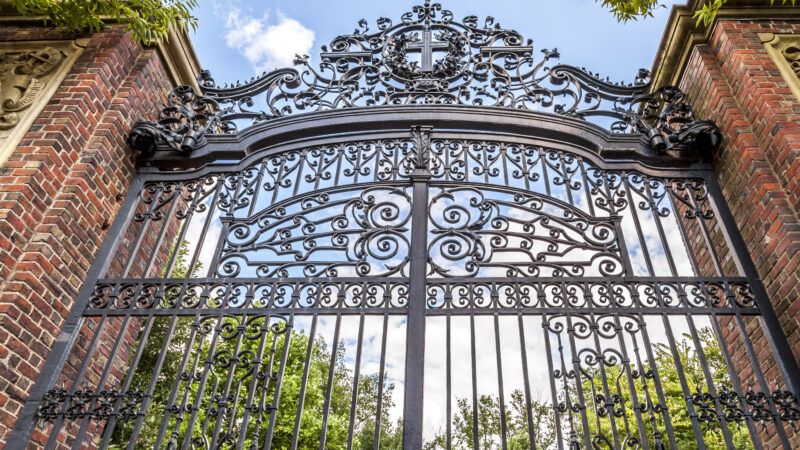Harvard Students Who Get COVID Will No Longer Be Put in Isolation Housing
Harvard University is easing up on onerous restrictions against students that test COVID-19 positive. Does this signal a shift to normalcy for college students?

Students who test positive for COVID-19 will be required to self-isolate in their own dorms but not be required to move into university-provided isolation housing, Harvard announced this week. In addition, Harvard University Health Services will no longer call close contacts of positive students. Instead, students and affiliates who test positive will now be responsible for reaching out to their close contacts.
The Harvard Crimson reports that the university also shortened its isolation period for students who test positive for COVID-19 from 10 days to five days, aligning with recently updated Centers Disease Control policy. Students will have to adhere to a strict mask-wearing rule for five additional days after isolation whether they are asymptomatic or show mild symptoms. Current University policy otherwise requires students to wear masks in all indoor spaces with the exception of private areas such as a dorm room.
Vaccinated and asymptomatic students and affiliates will not be mandated to quarantine after coming into contact with a person who tests positive. Unvaccinated individuals or those who have not received a booster will be required to quarantine for five days after contact with an individual who tests positive. These new policies mark a significant shift for a university in which 98 percent of students are vaccinated against COVID-19.
The university's new policy comes at a time when the COVID-19 case count has skyrocketed on Harvard's campus. According to the university's COVID-19 Testing Dashboard, 467 Harvard students and affiliates tested positive over the past seven days, a sharp increase from the 45 that tested positive before Thanksgiving break.
Harvard University Health Services Director Giang T. Nguyen explained in an email to the Crimson that the rapid increase in positive cases caused by the omicron variant has made it more difficult for Harvard to maintain its previous policies.
"The updates to guidance and protocols we have made recognize the unprecedented number of cases within our community that we must support, while also continuing to take steps to reduce risk of transmission," Nguyen's email said.
Despite the rising case count, Harvard's decision to relax policies for those exposed to COVID-19 signals that the university has acknowledged there is not much benefit to stringent quarantines for an overwhelmingly vaccinated student body.
"With our Harvard community's near universal vaccination, the majority of infected individuals in our community are having no symptoms or mild symptoms that resolve quickly," Nguyen wrote.
Despite relaxing quarantining standards, Harvard still requires all students to be fully vaccinated and boosted against COVID-19. More than 1,100 colleges required the vaccine for at least some of their students and faculty according to a database provided by the Chronicle of Higher Education.
Editor's Note: As of February 29, 2024, commenting privileges on reason.com posts are limited to Reason Plus subscribers. Past commenters are grandfathered in for a temporary period. Subscribe here to preserve your ability to comment. Your Reason Plus subscription also gives you an ad-free version of reason.com, along with full access to the digital edition and archives of Reason magazine. We request that comments be civil and on-topic. We do not moderate or assume any responsibility for comments, which are owned by the readers who post them. Comments do not represent the views of reason.com or Reason Foundation. We reserve the right to delete any comment and ban commenters for any reason at any time. Comments may only be edited within 5 minutes of posting. Report abuses.
Please to post comments


How is anyone at Harvard getting covid if they are all vaccinated and boosted?
and in the question, we find the answer.
Sounds like they are admitting that they expect that everyone will be exposed enough to test positive at some point, despite all of their measures. 98% vaccination rate (full plus booster), indoor masking everywhere, and their case count still explodes from 45 in mid-November to over 10x that in mid-January.
Of course, that is a measure of "cases". Symptomatic cases? Hospitalized cases? Positive tests? What's the CT on the PCR's? Are we testing everyone regularly, even though they are vaccinated, wearing masks, and not ill? If so, why?
And, of course, the million-dollar question actually is: How many of these students are seriously ill?
That's the appropriate question to ask. Always has been, but in light of Omicron -- Omnicron -- which is remarkably infective, it's just whether people are getting badly ill. You're never stopping the spread of it.
Universities seem to be taking their in loco parentis roll as seriously as helicopter parents, though. We should be lucky they aren't forcing all students on campus to live like John Travolta in a 70s TV movie.
Emphasis on the loco, amirite?
All of them. You have to be pretty sick to attend harvard
Harvard was the first college of note to start the nonsense March 2020 when they closed and went on line. Rest of the Ivys fell in line and once the dominoes were falling, it was next to impossible for any college to not close their doors, as too did the rest of the nation's businesses. Flatten the curve. Just two weeks, guys, come on.
You have two choices on this one.
1. Because everything is different, and the science has re-settled and the danger of covid has changed dramatically.
b: This was never as dangerous as the policies suggested, and this is their way of coming around to admitting it.